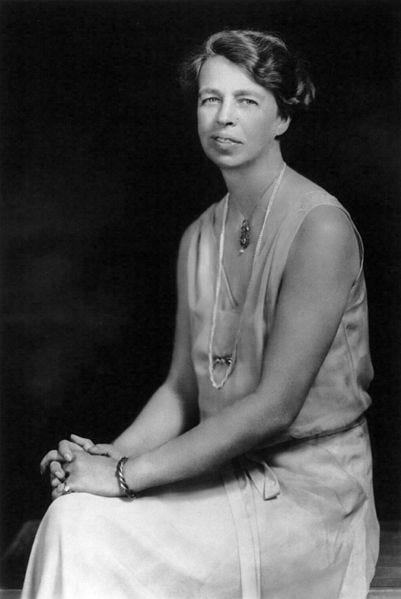Eleanor Roosevelt felt anxious about becoming America’s First Lady. The stories she heard about the lives of women in the role troubled her. She had also seen the experience firsthand from her uncle Theodore's time in office as President from 1901 - 1909. Eleanor knew the role as a ceremonial one, full of lonely hours and polite smiles, a job meant for a woman to be seen but not heard. The thought of merely planning social gatherings brought Eleanor immense angst. This was just not how she lived life.
Eleanor had already spent years working tirelessly in public service and activism. She had taught at a girls’ school, served in leadership roles with the Women’s Trade Union League, helped lead election campaigns, and fought for civil rights for black Americans and women long before her husband became President in 1932. The idea of giving all that up felt like a betrayal of everything she believed in.
So she didn't. And the role of First Lady, perhaps the very meaning of a woman's role in America, would be forever changed.
“You gain strength, courage, and confidence by every experience in which you really stop to look fear in the face. You are able to say to yourself, ‘I lived through this horror. I can take the next thing that comes along.’” - Eleanor Roosevelt
Eleanor was intensely competitive. When Franklin became President, he earned $75,000 per year. Eleanor decided she wanted to match his salary through her own writing and speaking engagements. When she achieved the goal, she reportedly exclaimed, “I’ve done it! I’ve earned as much as Franklin.” Then, characteristically, she donated most of the money to charity.
To give a simple reason for why Eleanor lived as she did would be unfair. But there are experiences we can draw from to explore some of the drivers behind her actions. Eleanor had grown up timid, haunted by self-doubt. “I was always afraid of something: of the dark, of displeasing people, of failure. Anything I accomplished had to be done across a barrier of fear,” she wrote.
Overcoming fear became an important ethos for Eleanor. People close to her observed that she also had a deep need, or at least a desire, to measure up, to be as capable as anyone around her. While some of her letters suggested she longed to spend more time relaxing with loved ones, she instead devoted most of her time to working.
About this latter point, she would also write: “I think I have a good deal of my Uncle Theodore in me because I could not, at any age, be content to take my place by the fireside and simply look on.”
So, just two days after Franklin's inauguration in March 1933, Eleanor decided to do something no First Lady had ever done before. She called a press conference.
Keep reading with a 7-day free trial
Subscribe to Historical Snapshots to keep reading this post and get 7 days of free access to the full post archives.




